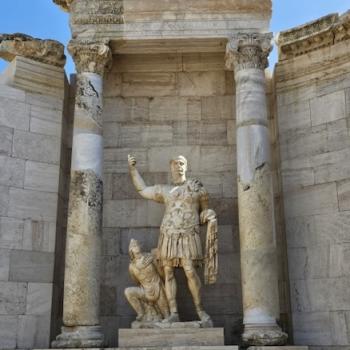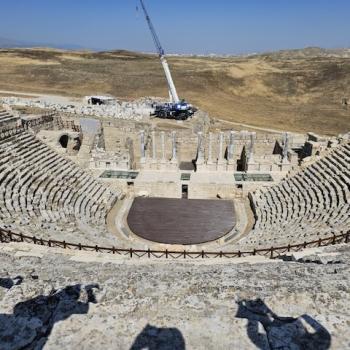BEN: What do you think Paul really means when he says love is the fulfillment of the Law? I ask this especially because it seems to me that by the Law of Christ, he does not simply mean Christ’s take on the Mosaic Law. The Law of Christ seems to involve: 1) some reaffirmation of some of the OT commandments; 2) the new imperatives of Christ himself as redone in the latter part of Rom. 12 and 13, and 3) new apostolic imperatives like ‘let those who will not work, not eat’! It seems clear to me from Rom. 10.4 that Christ is the end of the Mosaic Law, the end of the Mosaic covenant, and this is surely what Gal.4 suggests when Paul says the Mosaic covenant was an interim arrangement for God’s children until they came of age and maturity, whereas the new covenant is the fulfillment of the Abrahamic one, which Paul does not equate with the Mosaic one. In short, Paul in Galatians and elsewhere is not in the main attacking nitpicking legalism, nor is he anti-law, rather he makes all sorts of demands he sees as part of ‘the law of Christ’ (see Gal. 6). I do not think it’s adequate to say that Paul just believed that love in itself is the whole fulfillment of what God requires of us. Or at least, love has a very concrete shape and texture that includes all these other imperatives. I’ve not been happy with the New Perspective folks who wanted to say ‘works of the Law’ in Paul’s letters merely refers to the boundary rituals that divide Jew from Gentile. This is saying too little. What is your take on all this vis a vis love and Law?
PATRICK: That’s a big question in every sense Ben! I agree that we need to interpret Paul’s attitude to the law in a multi-layered way. Much difficulty I think has been caused by Old and New Perspectives pitting binary choices against one another. I find a threefold framework helpful (Brian Rosner).
1) The law is renounced as a means of justification (Gal.5:4). The Mosaic covenant has come to an end, the Abrahamic covenant is fulfilled. The law has no soteriological function (Gal.3:21).
2) The Mosaic law is fulfilled by life in the Spirit (Gal.5:5-6); not through Torah obedience, but in love of neighbour (Gal.5:14). The law could not accomplish the ‘outcomes’ described by the fruit of the Spirit (‘against such things there is no law’ Gal.5:23). Galatian believers are to carry each other’s burdens and so fulfil the law of Christ (Gal.6:2).
3) But the law still has a key place in Paul’s thought. It is reinterpreted in at least two ways:
(i) As prophecy, witnessing to the gospel of Jesus Christ. Dozens of examples exist. The story of Abraham in Romans and Galatians is one. The Torah itself affirms that God is a God of Jews and of Gentiles. Paul’s gospel is actually a consummation of the Torah’s promises.
(ii) As a source for ethics. In lots of places Paul continues to use the law as a source of moral guidance and wisdom. The ‘love command’ for new Christian communities, is developed from the Torah where it applied to Israel (Gal.5:14 / Lev.19:18). Paul does not include regulations on ‘boundary markers’ like circumcision, Sabbath, food laws and festivals because his focus is missional – on the place of Gentiles within the family of God. It is as if the law has been redefined or filtered in light of the gospel.













